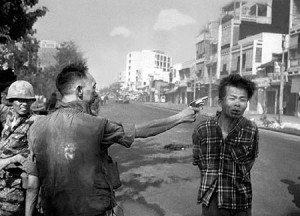
Eddie Adams’s Pulitzer Prize-winning photo taken on the streets of Saigon during the Tet Offensive sent shock waves through America
In the early hours of 31st January 1968, thirteen years into the Vietnam War, 70,000 North Vietnamese and Vietcong forces launched a wave of simultaneous attacks on more than 100 towns and cities in South Vietnam. This audacious operation took America and its South Vietnamese allies entirely by surprise. Not only did the attack violate the two-day truce both sides had pledged to observe around Tet – the Vietnamese Lunar New Year – but just a few weeks earlier, the commander of American military operations General Westmoreland had smugly declared the Communists were “unable to mount a major offensive” and dared them to “try something, because we are looking for a fight.” Well ‘try something’ they did, and then some. The Vietcong soldiers stormed the highland towns of Banmethout, Kontum and Pleiku, and invaded 13 of the 16 supposedly impregnable provincial capitals of the heavily populated Mekong Delta. A small group of commandos even seized the US embassy in Saigon. The so-called Tet Offensive – one of the great modern military campaigns – would shake US imperialism to its roots, and prove to be the psychological turning point of the Vietnam War.
In the ensuing days, Americans turned on their televisions to find scenes of chaos and carnage. This was the first ‘television war’ – and when Brigadier General Nguyễn Ngọc Loan raised his pistol, extended his arm and fired a bullet through the head of his Vietcong prisoner, NBC cameraman and photographer Eddie Adams captured the harrowing moment which was subsequently splashed across 50 million tv screens. Americans could not believe what they were seeing. Public opinion turned overnight as a horrified nation realised that the anti-war movement had been right all along: this was a savage and unjust war. And, even more unthinkable to these ingrained patriots, they’d been duped. In the months prior to Tet, Lydon B. Johnson had undertaken a bullish ‘progress campaign’ to reassure Americans that victory in Vietnam was just around the corner. But suddenly his rhetoric was exposed as lies. The scale and surprise of the offensive sent a shock wave through the American psyche. As Johnson’s former aide Robert Koner put it, “Boom, 40 towns get attacked, and they didn’t believe us anymore.”
The genius of the Tet Offensive was that, strictly speaking, it was a resounding military victory for the United States. The US and South Vietnamese lost 6,000 men while the North Vietnamese lost a staggering 50,000 and their entire command structure in the south. But the Vietcong objective all along had been to symbolically and psychologically target the American political system, and that they did. According to US Secretary of State Henry Kissinger, “Henceforth, no matter how effective our action, the prevalent strategy could no longer achieve its objectives within a period or within force levels politically acceptable to the American people.”
The anti-war movement subsequently intensified and took a marked violent turn against a government whose credibility was in tatters. Johnson’s popularity went into freefall, the final nail in his coffin hammered in by the media when the highly respected anchorman of CBS News, Walter Cronkite, voiced the opinion that the war might not be winnable. “If I’ve lost Cronkite,” Johnson was reported to have said, “I’ve lost Middle America.” Two months later, after suffering a humiliating defeat in election primaries, Johnson announced: “I shall not seek, and I will not accept, the nomination of my party for another term as your President.” He also announced the opening of negotiations with the North Vietnamese, but this would amount to little: the war would drag on for another five pointless and gruelling years.
The worldwide political landscape has changed entirely in the decades since the Tet Offensive – but there remains a significant lasting legacy. Because the media had such a catastrophic effect on public opinion, the American military henceforth took over coverage of wars – censoring footage of caskets, dead bodies and wounded soldiers. War reportage would never again be so brutal, or honest.


5 Responses to 31st January 1968 – the Tet Offensive